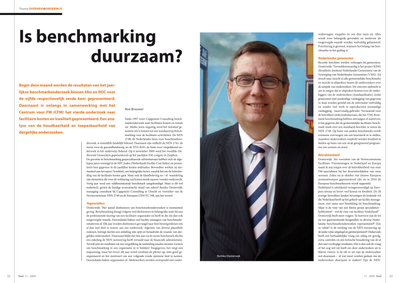While the original definition of replacement focuses on the replacement of the use of animals in science, a more contemporary definition focuses on accelerating the development and use of predictive and robust models, based on the latest science and technologies, to address scientific questions without the use of animals. The transition to animal free innovation is on the political agenda in and outside the European Union. The Beyond Animal Testing Index (BATI) is a benchmarking instrument designed to provide insight into the activities and contributions of research institutes to the transition to animal free innovation. The BATI allows participating organizations to learn from each other and stimulates continuous improvement. The BATI was modelled after the Access to Medicine Index, which benchmarks pharmaceutical companies on their efforts to make medicines widely available in developing countries. A prototype of the BATI was field-tested with three Dutch academic medical centers and two universities in 2020-2021. The field test demonstrated the usability and effectiveness of the BATI as a benchmarking tool. Analyses were performed across five different domains. The participating institutes concluded that the BATI served as an internal as well as an external stimulus to share, learn, and improve institutional strategies towards the transition to animal free innovation. The BATI also identified gaps in the development and implementation of 3R technologies. Hence, the BATI might be a suitable instrument for monitoring the effectiveness of policies. BATI version 1.0 is ready to be used for benchmarking at a larger scale.
DOCUMENT

Begin deze maand werden de resultaten van het jaarlijkse benchmarkonderzoek binnen hbo en ROC voor de vijfde respectievelijk zesde keer gepresenteerd. Daarnaast is onlangs in samenwerking met het Centrum voor FM (CFM) het vierde onderzoek naar facilitaire kosten en kwaliteit gepresenteerd. Een analyse van de houdbaarheid en toepasbaarheid van dergelijke onderzoeken.
DOCUMENT

Denim Democracy from the Alliance for Responsible Denim (ARD) is an interactive exhibition that celebrates the journey and learning of ARD members, educates visitors about sustainable denim and highlights how companies collaborate together to achieve results. Through sight, sound and tactile sensations, the visitor experiences and fully engages sustainable denim production. The exhibition launches in October 2018 in Amsterdam and travels to key venues and locations in the Netherlands until April 2019. As consumers, we love denim but the denim industry, like other sub-sectors in the textile, apparel and footwear industries, faces many complex sustainability challenges and has been criticized for its polluting and hazardous production practices. The Alliance for Responsible Denim project brought leading denim brands, suppliers and stakeholders together to collectively address these issues and take initial steps towards improving the ecological sustainability impact of denim production. Sustainability challenges are considered very complex and economically undesirable for individual companies to address alone. In denim, small and medium sized denim firms face specific challenges, such as lower economies of scale and lower buying power to affect change in practices. There is great benefit in combining denim companies' resources and knowledge so that collective experimentation and learning can lift the sustainability standards of the industry and lead to the development of common standards and benchmarks on a scale that matters. If meaningful, transformative industrial change is to be made, then it calls for collaboration between denim industry stakeholders that goes beyond supplier-buyer relations and includes horizontal value chain collaboration of competing large and small denim brands. However collaboration between organizations, and especially between competitors, is highly complex and prone to failure. The research behind the Alliance for Responsible Denim project asked a central research question: how do competitors effectively collaborate together to create common, industry standards on resource use and benchmarks for improved ecological sustainability? To answer this question, we used a mixed-method, action research approach. The Alliance for Responsible Denim project mobilized and facilitated denim brands to collectively identify ways to reduce the use of water and chemicals in denim production and then aided them to implement these practices individually in their respective firms.
The denim industry faces many complex sustainability challenges and has been especially criticized for its polluting and hazardous production practices. Reducing resource use of water, chemicals and energy and changing denim production practices calls for collaboration between various stakeholders, including competing denim brands. There is great benefit in combining denim brands’ resources and knowledge so that commonly defined standards and benchmarks are developed and realized on a scale that matters. Collaboration however, and especially between competitors, is highly complex and prone to fail. This project brings leading denim brands together to collectively take initial steps towards improving the ecological sustainability impact of denim production, particularly by establishing measurements, benchmarks and standards for resource use (e.g. chemicals, water, energy) and creating best practices for effective collaboration. The central research question of our project is: How do denim brands effectively collaborate together to create common, industry standards on resource use and benchmarks for improved ecological sustainability in denim production? To answer this question, we will use a mixed-method, action research approach. The project’s research setting is the Amsterdam Metropolitan Area (MRA), which has a strong denim cluster and is home to many international denim brands and start-ups.
Het project richt zich op het ontwikkelen van een lerend zorgsysteem in de wijkverpleging. Door de vergrijzing en de trend om langer thuis te blijven wonen, stijgt de vraag naar zorg en ondersteuning aan huis, terwijl er een tekort is aan zorgprofessionals. Om de zorg van hoge kwaliteit te houden is passende zorg noodzakelijk. Een lerend zorgsysteem kan hierbij helpen.